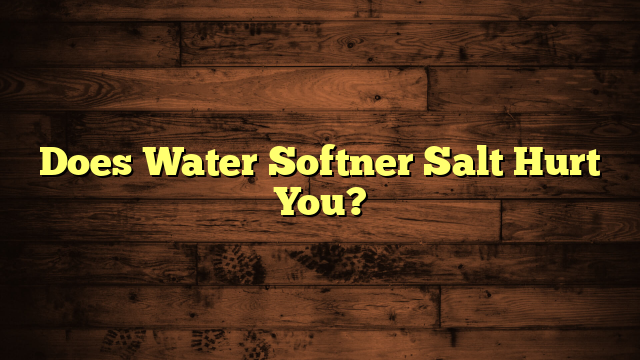Does Water Softner Salt Hurt You?
Many people underestimate the potential health implications of water softener salt, especially regarding sodium intake. If you've got high blood pressure or heart conditions, this added sodium could greatly affect your health. You might also be surprised to learn that softened water can irritate the skin for some users, leading to discomfort. So, what options do you have to manage these risks? Understanding the nuances of water softener salt can be essential for your well-being and daily comfort.
Key Takeaways
- Water softener salt can increase sodium intake, potentially affecting individuals with hypertension or cardiovascular conditions.
- Softened water may irritate sensitive skin, causing symptoms like redness and dryness due to increased sodium levels.
- High sodium levels in softened water can contribute to overall dietary sodium, which is a concern for those on sodium-restricted diets.
- Brine discharge from water softeners can harm the environment, affecting aquatic life and soil quality due to increased salinity.
- Using potassium-based salts or reverse osmosis systems can reduce sodium intake while still softening water effectively.
Understanding Water Softener Salt
Understanding water softener salt is essential for maintaining your household water quality. This salt plays a vital role in various water softener types, helping to remove hard minerals like calcium and magnesium from your water supply.
When you choose a water softener, it's important to evaluate the type that best suits your needs, whether it's a salt-based system or a salt-free alternative.
Salt-based water softeners typically use sodium chloride or potassium chloride as their primary salt. These options effectively regenerate the resin beads that attract and trap hard minerals.
However, if you're concerned about sodium intake or environmental impact, you might explore salt alternatives. These options include potassium-based salts or even systems that use citric acid or other natural substances to soften water without traditional salt.
How Water Softeners Work
Water softeners operate by removing hard minerals from your water supply, guaranteeing it's gentler on your skin, plumbing, and appliances. The water softening process primarily relies on a technique called ion exchange. In this method, hard minerals like calcium and magnesium are swapped out for sodium or potassium ions.
Here's a quick overview of the key components involved in this process:
| Component | Function |
|---|---|
| Resin Tank | Contains resin beads that attract hard minerals. |
| Brine Tank | Holds salt solution used for regeneration. |
| Control Valve | Regulates the flow of water through the system. |
| Backwash Cycle | Cleans the resin beads by flushing them out. |
| Regeneration Cycle | Replaces hard minerals with sodium ions. |
During the ion exchange process, when water flows through the resin tank, the hard minerals adhere to the resin beads. Eventually, the resin beads become saturated and require regeneration, where the brine solution flushes out the hard minerals, replenishing the sodium ions. This continuous cycle guarantees that you enjoy soft water for all your daily activities.
Health Risks of Water Softener Salt
When you use a water softener, you mightn't realize the potential health risks associated with the salt it uses.
Increased sodium intake can be a concern, especially for those with certain health conditions, while some people may experience skin irritation from softened water.
Furthermore, the environmental impact of excess salt on local ecosystems raises important questions about sustainability and safety.
Sodium Intake Concerns
Often overlooked, sodium intake from water softener salt can raise health concerns, especially for those on restricted diets. If you're monitoring your dietary sodium due to health issues like sodium hypertension, you might want to take into account the implications of using a water softener. These systems typically use sodium chloride to soften water, which can increase the sodium levels in your household water supply.
For individuals on low-sodium diets, the extra sodium from softened water can be significant. Even small amounts can add up, potentially pushing your daily intake over recommended limits. This is particularly important if you're already consuming processed foods, which can be high in dietary sodium.
It's essential to be aware of your total sodium intake, as high levels can lead to health risks, including elevated blood pressure and cardiovascular issues.
If you're concerned about sodium in your water, you might think about alternatives like potassium-based softeners or simply using a filtration system for drinking water. Always consult with a healthcare professional if you're unsure about how these factors might affect your health.
Your well-being matters, so stay informed and proactive about your sodium consumption!
Skin Irritation Risks
Softened water can lead to skin irritation for some individuals, especially those with sensitive skin or preexisting conditions like eczema. When you use a water softener, the sodium levels in your water increase, which can exacerbate skin sensitivity.
If you've noticed redness, itching, or dryness after bathing, it might be time to reflect on the effects of softened water on your skin.
People with skin allergies may also experience adverse reactions, as the salt can strip natural oils from your skin, leaving it vulnerable. This stripping can lead to increased irritation and discomfort.
While many enjoy the benefits of soft water for cleaning and laundry, it's crucial to listen to your body. If you're prone to skin issues, you might want to monitor how your skin reacts.
In some cases, you may need to adjust your water softener settings, try alternative water treatments, or incorporate moisturizers to counteract the effects of softened water.
Taking preventive measures can help you maintain healthy skin while enjoying the advantages of a water softener. Always consult a dermatologist if you have persistent concerns about skin irritation.
Environmental Impact Issues
Water softener salt can have significant environmental impacts, particularly on local water systems. When you use traditional water softeners, they often discharge brine—highly concentrated salt solutions—into storm drains or sewage systems. This can lead to increased salinity in freshwater sources, which negatively affects aquatic life and disrupts the ecosystem.
Fish and other aquatic species may struggle to survive in higher salinity levels, disrupting the balance of local habitats.
Adopting sustainability practices, such as using alternative water softening methods or opting for potassium-based salt, can help mitigate these harmful effects. By reducing salt discharge, you contribute to healthier water systems and promote biodiversity. You mightn't realize it, but your choices can directly impact the quality of local waterways.
Additionally, communities face challenges with infrastructure, as increased salinity can corrode pipes and treatment facilities, leading to costly repairs.
Sodium Levels and Health Concerns
When it comes to sodium levels, understanding your intake is essential for your health.
The recommended limits can vary, but excessive sodium can lead to serious health risks, such as high blood pressure and heart disease.
If you're concerned about your sodium consumption from water softeners, exploring alternatives might be worth considering.
Sodium Intake Recommendations
Understanding sodium intake recommendations is essential for maintaining good health, especially since excessive sodium consumption can lead to serious health concerns.
The Dietary Guidelines for Americans suggest that most adults should limit sodium intake to less than 2,300 milligrams per day. This recommendation is important because many common sodium sources, like processed foods, canned soups, and restaurant meals, often contain high levels of sodium.
It's vital to read nutrition labels and be aware of the sodium content in the foods you eat. You might be surprised to find that even seemingly healthy options can be loaded with sodium.
Fresh fruits and vegetables, on the other hand, are naturally low in sodium and should make up a significant part of your diet.
If you have specific health conditions, like hypertension, your healthcare provider might recommend an even lower intake—around 1,500 milligrams per day.
Balancing your sodium intake is key to promoting overall health. By being mindful of your dietary choices and understanding these guidelines, you can enjoy a flavorful diet without compromising your well-being.
Health Risks Explained
Excessive sodium levels in your diet can lead to a range of health issues, making it essential to monitor your intake. High sodium consumption is often linked to conditions like hypertension, heart disease, and stroke.
If you're using a water softener, be aware that the salt used can add to your sodium intake, potentially exacerbating these health implications.
You mightn't realize how much sodium you're consuming through softened water, especially if you're already following a sodium-restricted diet. This is why it's vital to explore alternatives. Water softener alternatives, like potassium-based systems, can reduce sodium levels in your water, helping you maintain a healthier balance.
If you're concerned about the sodium in your diet, take a closer look at your water source. Checking labels on food products and being mindful of processed foods can also help you manage your sodium intake effectively.
Alternatives to Consider
Exploring alternatives to traditional sodium-based water softeners can greatly benefit your health. If you're concerned about sodium intake, consider these options that can help soften your water without compromising your well-being:
- Potassium Chloride: This natural mineral is a popular substitute for sodium chloride. It softens water effectively while contributing potassium, which is essential for your body.
- Magnesium Citrate: Another great alternative, magnesium citrate is beneficial for both water softening and your health. It offers a softer feel and can help reduce scaling in pipes.
- Reverse Osmosis Systems: These systems filter out hard minerals and impurities, providing clean water without adding any salts. They're particularly useful for drinking and cooking.
- Descaling Agents: These chemical compounds work to break down mineral buildup in your plumbing without altering the sodium levels in your water. They're an effective way to manage hardness.
Alternatives to Traditional Salt
Many homeowners are now turning to alternatives to traditional salt for their water softening needs. One popular option is potassium chloride. This mineral not only softens water but also contributes potassium, which can be beneficial if you're watching your sodium intake.
It's a great way to maintain water quality without the health concerns associated with excessive sodium.
Another effective alternative is magnesium sulfate, commonly known as Epsom salt. While it's often used for baths and gardening, it can also soften water.
Magnesium interacts with the hardness-causing minerals, making it easier for your water softener to do its job. Plus, it can provide additional benefits for your skin and plants!
Choosing these alternatives can help reduce your sodium footprint while still achieving the softness you desire in your water.
Make sure to consult your water softener's manual or a professional to determine compatibility, as not all systems work with every type of salt.
Environmental Impact of Water Softener Salt
Using traditional water softener salt can have significant environmental consequences that homeowners often overlook. While softening water makes it easier for you to manage, the impact of excess salt on the environment is a concern.
Here are some environmental considerations to keep in mind:
- Water Pollution: High levels of sodium can contaminate local water supplies, affecting aquatic life and drinking water quality.
- Soil Degradation: Excess salt can leach into the soil, harming plants and reducing agricultural productivity.
- Infrastructure Damage: Salt runoff can corrode pipes and infrastructure, leading to costly repairs and maintenance.
- Wildlife Impact: Increased salinity in water bodies can disrupt ecosystems, endangering species sensitive to changes in their environment.
Considering these issues, you might want to explore salt alternatives.
These options can reduce your environmental footprint while still providing effective water softening. By making informed choices, you can protect your surroundings and promote sustainability.
It's important to weigh the benefits against the potential harm, ensuring your water treatment methods align with your environmental values.
Expert Opinions on Safety
When it comes to the safety of water softener salt, expert opinions vary widely. Some professionals argue that when used correctly, water softener salt poses minimal risk to health. They emphasize that it meets essential safety regulations and aligns with health guidelines set by various organizations.
However, others express concerns, especially regarding sodium levels in drinking water. High sodium intake can lead to health issues, particularly in individuals with pre-existing conditions like hypertension.
Experts suggest you be aware of these risks, especially if you live in areas where the water supply has already high sodium content. They recommend monitoring your overall sodium intake from all sources, not just softened water.
Additionally, some health professionals argue that alternative water softening systems, such as potassium-based options, might be safer for those worried about sodium consumption.
Ultimately, the consensus is that while water softener salt is generally considered safe, it's important to stay informed. By understanding the associated health guidelines and safety regulations, you can make educated decisions about your water softening needs and maintain your health effectively.
Best Practices for Use
To guarantee the safe and effective use of water softener salt, it's important to follow best practices. Adhering to proper usage guidelines and safety precautions guarantees your system operates efficiently while minimizing any potential risks.
Here are some key points to keep in mind:
- Choose Quality Salt: Always opt for high-quality water softener salt to guarantee peak performance and prevent clogs in your system.
- Monitor Salt Levels: Regularly check and maintain the salt levels in your brine tank. Keeping it at least half full helps your water softener function properly.
- Store Correctly: Store salt in a cool, dry place to prevent moisture absorption and clumping, which can hinder its effectiveness.
- Avoid Overuse: Don't overfill your brine tank. Excess salt can lead to system malfunctions and inefficient softening.
Frequently Asked Questions
Can Pets Consume Water Softener Salt Safely?
You should be cautious about your pet's safety around water softener salt. It can pose salt toxicity risks, leading to health issues. Always keep it out of your pet's reach to guarantee their well-being.
Is Water Softener Salt Harmful to Plants?
When it comes to your garden, water softener effects can be a double-edged sword. You'll want to avoid using it, as it can harm plant health by increasing sodium levels and disrupting nutrient absorption.
How Does Water Softener Salt Affect Plumbing Systems?
Water softener salt can impact your plumbing systems by causing salt buildup. Regular plumbing maintenance helps prevent clogs and corrosion, ensuring your pipes remain in good condition and function properly for years to come.
Can Water Softener Salt Cause Skin Irritation?
Could something as simple as water softener salt irritate your skin? If you have skin sensitivity, it might cause discomfort over time, leading to potential long-term effects. Always monitor your skin's reaction to softened water.
What Should I Do if I Accidentally Ingest Water Softener Salt?
If you accidentally ingest water softener salt, don't panic. Rinse your mouth, drink water to dilute, and monitor for symptoms. If discomfort arises, contact a healthcare professional to assess any salt toxicity concerns.
Conclusion
In the grand garden of health, water softener salt can be a thorny rose for some, particularly those with high blood pressure. While it blooms with benefits like softer skin and cleaner pipes, it also harbors hidden sodium that can clash with dietary needs. Consider potassium-based alternatives as your gardening gloves, protecting you from prickly health risks. Always consult a healthcare professional to guarantee your garden thrives, and remember, every choice shapes your health landscape.







